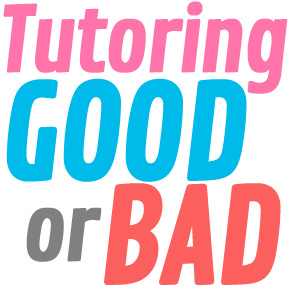Tutoring Good or Bad…
Tutoring Good or Bad… Possibly depends on where you are in the world
As I read this BBC article (Meet the ‘tutor kings and queens’) yesterday, I was not really surprised at the success of these ‘Tutors’ in the East. After all, having been born and bred in Malaysia, where private tutoring has always had a place in the education system, it was definitely the norm, even when I was growing up.
What struck me as most interesting about the article though, wasn’t actually the article itself, but the comments that came after it.
At the end of the article was a list of questions, and I suppose at some point, the public were invited to voice their opinions.
Does tutoring put too much pressure on pupils? Does it give some students an unfair advantage? Or is it offering an extra way of improving standards in schools?

So why this discrepancy?
I suppose, I am uniquely placed to offer an insight in to both angles. Having been raised as part of the over-achiever, ‘kiasu’ (directly translates to ‘afraid to lose’ but will require a whole blog post of it’s own) culture of the East and now working directly in education in the West, I see both sides and how each can learn lessons from the other.
Most Western politicians, responsible for Education believe that the Education Systems of the East have surpassed all others in the ways that they have consistent produced top-performing, over-acheiving results, especially in that all important PISA study. What they often fail to see is that Education in the East is viewed solely as society’s mobility factor, hence there is a great emphasis and focus on achieving excellent grades.
I suppose the most important lesson for the Western politician is that Academic Success in the East is not necessarily a product of the country’s Education System, but rather a result of parental and societal expectations.
Parental influence, peer pressure and self-driven expectations to achieve the best grades academically are typical of Asian students. The bookworm, geek or nerd is held in high esteem in the Asian school system, where it is cool to be the cleverest and most outstanding student.
This is as opposed to the West where clever students are mocked, and if you do know the answer in class, it’s best to keep your head down and pretend that you don’t. It’s much much better to be cool or popular, even if your grades count for nothing.
Also there seems to be, in the UK at least, a great unwillingness for the average person to want to strive out of their perceived ‘working-class’ roots to something better, whereas, in Asian cultures, there is no shame in wanting better or wanting more, and working hard to make that move upwards.
That is not to say that I agree with the way Education is being solely exam and performance-driven in the East. It is without a doubt an immense failing of an Education System to not be able to produce thinking, questioning citizens, typical of these Eastern Education Systems.
On the other hand, the lower demands of students in the West certainly does their students no favours.
So what lessons do you think the West can learn from the East, and the East from the West? Do share your thoughts with us.
To make sure you continue to receive interesting exciting articles at the forefront of learning with technology, remember subscribe to our updates and follow @ColorMyLearning on Twitter and Like us on Facebook.
Author: Li-ling, tweets as DrOoi and is passionate about all things learning.
You will benefit from a newsletter updates straight to your mailbox from ColourMyLearning.
Don’t forget to rate this article

















November 29, 2012 @ 2:18 am
Well i wouldn’t know what the West/East can learn from the East/West, but i know this; tutoring is only effective if a student is willing to learn & has the desire to improve. Cliche, i know, but it’s cliche for a reason (which won’t be covered here).
In the Malaysian context, particularly Sarawak, an eastern state, tutoring or tuition as what we call it here is not too dissimilar to what you can find in other Asian countries. Parents here are just as obsessed with the magical 90%, the academic end zone. The more ‘modest’ ones would aim for 80%. Anything below would send tiger moms to the tuition teacher & demand for explanation. It is not atypical to hear mothers in school canteens comparing grades & tuition schools.
While our ‘rock star’ tutors here aren’t as glam as their Hong Kong counterparts, they draw students to them like flies. Rather tiger moms are the one most susceptible as they are more obsessed with academic excellence & future of their children. i would hear some moms grumbling about their kids being cramped in a jam-packed classroom (of almost 100!) & questioning if such environment is just as ineffective as class in school.
There are those who would swear by these rock star tutors, that they deliver as expected. i would say that may be true up to a point. These ‘deities’ of academic excellence may start out just like any other tutors. However once they reach critical mass, they start undermining the very idea of education. They cherry-pick. No prize for guessing who they pick.
Whoever that gets left out will go to ‘mediocre’ tutors. Sadly tiger moms remain their worst enemy as they would question & compare the tutors with others. They would start with teaching materials and later move on to pedagogical practices.
November 29, 2012 @ 10:15 am
Thank you for sharing your thoughts Brendan. I completely agree that in the end it is up to the students themselves whether or not they want to succeed academically.
From my ‘on the fence’ observations, the East has placed academic achievement on such a high pedestal it’s comes across as an all or nothing effort (certainly unhealthy) but in some ways the lessons for the West do remain that the value of an education is deeply worthwhile.
Similarly, in the West there is an acceptance somewhat, that life is not all about academic achievement (a very laudable goal, and a great lesson for the East) but it also becomes a barrier to greater achievement when throngs of youngsters believe the way to success is ‘instant fame’ ala X-Factor.
The middle line between the two, although infinitely challenging to achieve, must be the ideal scenario surely?
November 29, 2012 @ 5:25 pm
Ken Robinson hit the nail when he talked about how talent is wasted in education through various factors which “include a narrow emphasis on certain sorts of academic work; the exile of arts, humanities and physical education programs from schools; arid approaches to teaching math and sciences; an obsessive culture of standardized testing and tight financial pressures to teach to the tests.”
http://edition.cnn.com/2009/OPINION/11/03/robinson.schools.stifle.creativity/index.html
November 29, 2012 @ 5:28 pm
“Education is about developing human beings, and human development is not mechanical or linear. It is organic and dynamic.” Ken Robinson
November 29, 2012 @ 6:03 pm
I used to agree, until I realised that Education for the masses ultimately will always come down to standardised measures, in order simply to cater to the masses. I do not dispute with Ken Robinson’s point or outlook that Schools lack Creativity, however for education to work for the masses, unfortunately creativity will always be at the losing end.
If one were to view Learning as separate from the System of Education (think home schooling and un-schooling), then the greater flexibility, instances of higher order thinking, fewer time pressures on achievements would certainly allow creativity to flourish. Unfortunately, education as politicians know it, isn’t about bringing out the best in the people but to add numbers to their statistical forms to say ‘Ahh…this many people have now reached the standard to go to University’.
November 29, 2012 @ 11:05 pm
Everyone who has contact with another person is an educator.
It depends what you mean by education. If it is about knowledge, school, books, internet, etc. are the place. If it means life skills, then life is your playground. I don’t see why we only categorise education to only formal learning. I moan at how sensible adults derogate their responsibilities to the state and educators to ‘educate’ their children.
The government are not interested in individual successes. They are more interested in the numbers and economics. They want to spend the minimum to obtain the maximum results and this causes under resourcing to those who need more resources to keep up and to those who could use a bit more to flourish. It is a numbers game. Sadly UK education policy rewards mediocrity.
The educators are bound by the government targets. So even with the best intentions, their biggest overriding interest is to keep their pay package and the surest way is not to piss off the paymaster. They have to play the numbers game to please the paymaster.
Private tutors play their own numbers game. Superstar tutors aim to achieve high A grade percentages and hope for a few superstar students to boost their reputation and gain more students. The problem with this is that weaker students may get left behind as “collateral”. Things may be different for tutors who teach an individual student exclusively or teach in a small peer group. This sort of tutor may have more time to get to know the student and chart the development but will never achieve the superstar or the income status.
Every child is creative. I always knew that. They just need the time, space and acceptance (this is often lacking) to explore. I would also prefer an end to national exams as they are mostly pointless and disrupts real education.
The phenomena of kiasu and tiger moms shows a sense of insecurity. Some children may come out of it unscathed but many risk inheriting the insecurities of their parents. It takes a strong child to grow up and finally say no.
It all comes down to who has the purest motive for ‘educating’ the child? And that person will be the most effective to teach the child if given the right knowledge and tools.
Thus for every failure of a child to perform in life, I don’t blame the state, schools or tutors. They are just doing their jobs in a system that pleases no one. I blame the party that has the most interest and most influence on the child – the carer of the child because they fail to recognise the importance of their role as educators. But this is something no politician or educators in the West wants to touch on as it is bad politics similar to not wanting to talk about people’s lifestyle choices and how it affects their health. So they skirt around the issue.
Sometimes I think they might as well give me the money they will spend on my child’s education and I will do the rest. I am all for funding for home schooling.
November 30, 2012 @ 12:23 pm
Pedeg, Thank you for your thought-provoking comments. You are absolutely right and I especially like the fact that you mention carers of children as having the most important influence. There’s obviously a very big question of ‘who’ these carers are? With many 2-income families, devoted utterly to career pursuits, I have seen many instances in which child-raising is left to schools, child-minders and nannies. Not that child-minders and nannies, don’t do a good job, but I am certain they are no parental replacement.
The ‘numbers game’ as you call it, and no matter how much I agree, will always be a necessary evil, as formative assessments will never be equivalent. I for one, am a very lenient marker, simply for the reason that I too don’t believe that test and exams provide a holistic picture.
Have you heard of un-schooling? As I think this will definitely appeal to you and your children. Admittedly though, as much as I like the idea of it, I equally worry about children not necessarily achieving their full potential if left to their own devices. The internal conflict obviously arises when the question is ‘Which is more important in life? To be successful or to be happy?’ Definitely another post in there somewhere 🙂
November 30, 2012 @ 1:48 am
Is university the pinnacle for humanity? is that the best humanity can achieve? Does it have to be all brains & nothing else? Is a university professor the best outcome of human endeavour?
Politicians will continue to have their say in things but that doesn’t mean we should give in. As an educator who has come to accept his students as his children, there is a lot to lose should i go down the paths set by politicians who know next to nothing about what children need to & grow flourish in order to carry the fate of humanity.
We are, as humanity, devolving by not evolving.
November 30, 2012 @ 12:30 pm
Brendan, Thank you for your thoughts and comments.
I certainly do not think that a University education is the ultimate goal in education. As far as politicians and education systems go though, that certainly seems to be one of the most sought after measures.
And yes I do agree – politicians have no place tinkering with education systems especially when they’re least qualified to do so.